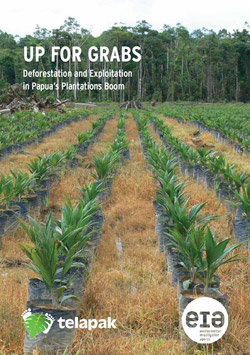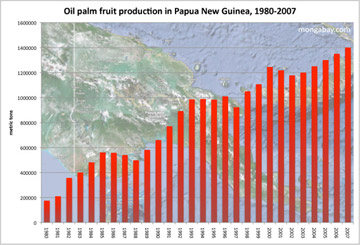Oil palm developers in the Indonesian half of New Guinea are signing questionable deals that exploit local communities and put important forest ecosystems at risk, alleges a new report from Environmental Investigation Agency (EIA) and Telapak.
The report, “Up for Grabs”, warns that five million hectares of land in Papua and West Papua are being targeted by powerful agroindustrial companies. The report alleges that developers are using deceptive tactics in signing land deals with local people, including pledging development benefits such as improved transport, schooling, and housing but then failing to deliver on the promises. In one case, investigators from EIA/Telapak encountered a four year old boy, son of a local landowner, who was asked to sign a contract so that a plantation company could ensure control of the land for decades.
“Up for Grabs” reports that communities are inking agreements that pay them below market rates for their land — from $1.50 to $45 per hectare. By comparison a developer can reap hundred to thousands of dollars a year from an oil palm plantation once it reaches maturity in 3-5 years.
EIA and Telapak also found companies illegally clearing forest for plantations before the necessary permits had been secured. The clearing was done with full government knowledge.
“Companies are tricking Papuans into giving up their land for oil palm plantations based on empty promises about their future welfare,” said Hapsoro of Telapak in a statement. “This is all happening with the backing of the government in the name of development.”
The report calls for a suspension of future plantation permits in Papua “until strong safeguards to support the rights of local communities and protect forests are put in place.” It also urges consumers of palm oil and timber in developing countries to carefully consider the role their behavior has in deforestation of Papua’s rainforests.

UP FOR GRABS: Deforestation and Exploitation in Papua’s Plantations Boom [PDF 1.45 MB]
Related articles
Palm oil developers in Papua New Guinea accused of deception in dealing with communities

(09/25/2009) Papua New Guinea, the independent eastern half of the world’s second largest island (New Guinea), houses one of the planet’s last frontier forests. These forests support a wealth of plants and animals as well as the Earth’s most diverse assemblage of cultures—some 830 languages are spoken in Papua New Guinea (PNG), representing more than 12 percent of the world’s 6,900. But PNG’s forests are fast-changing. Between 1972 and 2002 PNG lost more than 5 million hectares of forest, trailing only Brazil and Indonesia among tropical countries. Forest loss has been primarily a consequence of industrial logging and subsistence agriculture, but large-scale agroindustry—especially development of oil palm plantations—has emerged as an important new driver of land use change. Dozens of international companies have set up operations in the country over the past decade, including Cargill, an agribusiness giant based in Minneapolis. While Cargill says it is committed to sustainable and responsible palm oil production across its three plantations in PNG, the firm has been targeted by local and international NGOs, which claim it has polluted rivers and deceived local communities into signing agreements they do not understand. Some landowners say they are receiving few of the benefits oil palm promised to deliver, while losing their independence—they are now reliant on an export-oriented crop they can’t eat. Opposition to further oil palm expansion is now growing, especially in Oro Provice, where Cargill’s plantations are based.
Issues around palm oil development prove complex, controversial
(08/12/2009) A new report from published by the Center for International Forestry Research (CIFOR) highlights the benefits — and controversies — of large-scale expansion of oil palm agriculture in Southeast Asia. The review, titled “The impacts and opportunities of oil palm in Southeast Asia: What do we know and what do we need to know?”, notes that while oil palm is a highly productive and profitable crop, there are serious concerns about its environmental and social impact when established on disputed land or in place of tropical forests and peatlands.
Limit palm oil development to lands that store less than 40 tons of carbon/ha – study
(08/06/2009) A new study finds oil palm plantations store less carbon than previously believed, suggesting that palm oil produced through the conversion of tropical forests carries a substantial carbon debt.
